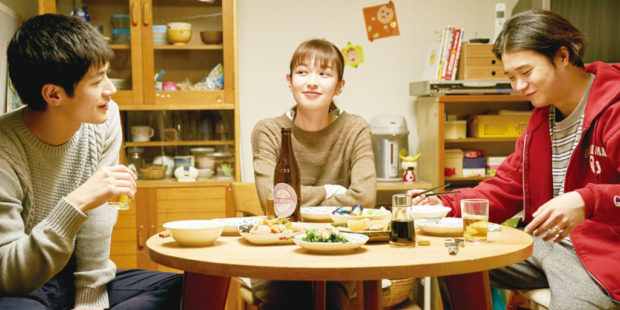In just under a decade, the already prolific filmmaker Rikiya Imaizumi has made a mark on the Japanese scene. This year alone, his adaptations of Just Only Love and LITTLE NIGHTS, LITTLE LOVE (アイネクライネナハトムジーク) have been doing the rounds on the local cinema and festival circuits, winning a few hearts along the way.
Based on the book by Kotaro Isaka, the story is a lot more low-key than his cult favourite Fish Story or the suspense thriller Golden Slumber. Drawing from various short stories in Eine Kleine Nachtmusik, the primary narrative centres on market researcher Sato (Haruma Miura). Waiting for a big romantic moment to bring a perfect match into his life, one day he spots the word “shampoo” written on the hand of a survey participant and wonders if that is a fateful sign.
Parallel to Sato’s story is that of hairdresser Minako (Shihori Kanjiya), who laments a similar lack of opportunities. At the urging of a colleague, she spends time talking to the brother of a client, and as they begin to get close she discovers that he is Manabu Ono (Sekigahara’s Eiki Narita), the first Japanese contender for a boxing championship.

The latter becomes one of the recurring motifs of the film, and emblematic of the importance people place on external rituals and events to their own happiness. Several characters resolve to make decisions based on the outcome of Manabu’s matches, for example. Sato’s colleague Fujima (Taizo Harada), who is surprised to find that his wife has just packed up and left, tries to use the wave of national good will towards the boxer to reforge a relationship with his daughter.
Yet director Rikiya Imaizumi is content to explore each of these characters through little vignettes. Some, like the rallying support of a deaf high school kid, shows the various character’s lives intersecting at various points. In this way, it functions as a minor hyperlinked narrative, but only to to demonstrate the commonality amongst the experiences. Singer-songwriter Kazuyoshi Saito’s catchy “Chiisana Yoru” (“Little Nights”), performed on screen by Taichi Kodama as a busker credited as Saito-san, serves as a linking mechanism.
Central performances are key, and delightful turns from Mikako Tabe, Haruma Miura and Erika Mori support the light dramatic touch. Without giving anything away, there is a time jump at one point in the film, and it is interesting to see how each of the actors evolves their character in this time.
The ultimate message around expectation versus reality, and playing the cards that you are dealt, is a refreshing one in a film that is charmingly relatable on many levels. Or as one character aptly puts it, “Don’t diss the cogs.” In fact, the only life challenge this film should leave you with is trying to get that theme song out of your head.
2019 | Japan | DIR: Rikiya Imaizumi | WRITERS: Kenichi Suzuki (based on the short story collection by Kotaro Isaka) | CAST: Haruma Miura, Mikako Tabe, Taizo Harada, Eiki Narita | DISTRIBUTOR: Gaga Corporation (JPN), Japanese Film Festival 2019 (AUS) | RUNNING TIME: 119 minutes | RELEASE DATE: October – December 2019 (JFF)






